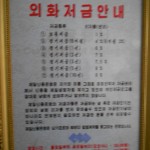The Korea Development Institute (KDI) recently published a report titled “5.24 조치 이후 남북교역과 북중무역의 변화: 데이터와 시사점”. The Daily NK translates this title to “Inter-Korean Trade and Changes in North Korea-China Trade after the May 24th Measure”. This report is part of KDI’s monthly series “KDI North Korea Economic Review” (KDI 북한경제리뷰) which you can check out on their web page.
You can download a PDF of this report here (PDF).
Here is what the Daily NK had to say about the report:
North Korea-China trade volumes have been increasing dramatically in the period 2009-2011, something which South Korean analysts tend to cite as a side-effect of the May 24th Measure.
The Korea Development Institute (KDI), in its recently released analysis, ‘Inter-Korean Trade and Changes in North Korea-China Trade after the May 24th Measure’, asserted, “North Korea-China trade in 2010 increased 29% (to $3.5billion) over the previous year. In 2011 the recorded amount was $5.6 billion, 63% more than the previous year.”
“Trade volumes have been going up drastically due to the 2010 May 24th Measure, and most of that trade has been North Korean exports to China,” it went on. “After the May 24th measure in 2010, North Korea’s exports to China increased 50% ($1.2 billion) compared to 2009. And in 2011 an increase of 107% ($2.5 billion) was recorded over 2010.”
In addition, “North Korea’s 2010 exports to China rose 21% compared to 2009, and in 2011 rose 39% compared to 2010. As North Korea’s exports to China led North Korea-China trade in 2010, North Korea’s trade deficit with China is also now declining.”
In 2001, North Korean exports to China were worth a mere $166 million, while imports weighed in with $570 million. In 2011, the last year on record, exports were worth $2.4 billion and imports $3.1 billion.
I cannot really comment on the story since my Korean is not good enough to read the report.
Read the full story here:
Trade Volumes Blamed on May 24th
Daily NK
Mok Yong Jae
2012-5-29

